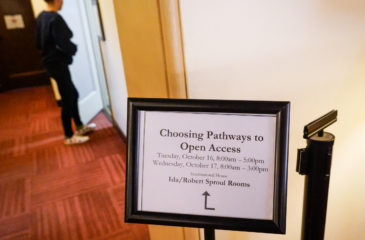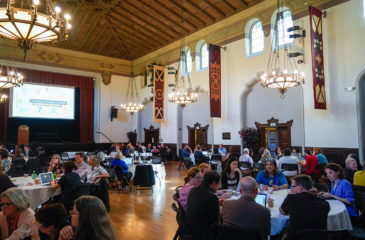Post Tagged with: "Pathways to OA"
-
Advancing Open Monograph Opportunities at UC: New Pathways for the Future
The University of California (UC) Libraries have released a new report, Advancing Open Monograph Opportunities at UC, outlining a values-based framework, key recommendations, and practical strategies for advancing open access (OA) monograph publishing. Developed within UC, the report is intended to inform and support conversations within the library and scholarly communication communities about how scholarly monographs—particularly in the arts, humanities, and social sciences (AHSS)—can be made more open, equitable, and sustainable. The report synthesizes the current landscape of OA monograph publishing and presents a framework including investment strategies and tactics that are grounded in shared scholarly values. The framework builds […]
-
Pathways to Open Access: Open Infrastructure and CDL
The Pathways blog series highlights CDL’s efforts on various pathways to open access and illustrates how diverse approaches can complement and reinforce each other–and how they can raise productive tensions that push us to think more critically about the work we do. We believe this kind of approach can move us toward true and comprehensive transformation of the scholarly communications landscape. What is the strategy described in this post? In this post, we focus on open infrastructure. While this topic is not always prominent in discussions about open access, it has become an essential part of our strategy at CDL and underpins […]
-
Pathways to Open Access: Library Publishing/Repository Services and CDL
The Pathways blog series highlights CDL’s efforts on various pathways to open access and illustrates how diverse approaches can complement and reinforce each other–and how they can raise productive tensions that push us to think more critically about the work we do. We believe this kind of approach can move us toward true and comprehensive transformation of the scholarly communications landscape. What is the strategy described in this post? This post discusses the California Digital Library’s eScholarship Publishing and Repository Services as core pathways to open access at the University of California. Ellen Finnie’s prior post in this series focused on the […]
-
Pathways to Open Access: Transformative Agreements and CDL
The Pathways blog series highlights CDL’s efforts on various pathways to open access and illustrates how diverse approaches can complement and reinforce each other–and how they can raise productive tensions that push us to think more critically about the work we do. We believe this kind of approach can move us toward true and comprehensive transformation of the scholarly communications landscape. What is the strategy described in this post? This post explores one path to open access: CDL’s efforts to advance transformative agreements. UC’s strategy for this pathway is grounded in what UC stakeholders refer to as the “moral imperative […]
-
CP2OA results are in: Open access efforts are taking flight
This post was written by the CP2OA planning committee and originally appeared on Berkeley Library Update. On October 16-17, 2018, University of California (UC) libraries hosted a working forum in Berkeley, California, called Choosing Pathways to Open Access (CP2OA). Sponsored by the University of California’s Council of University Librarians(CoUL), the forum was designed to enable North American library and consortium leaders and key academic stakeholders to engage in action-focused deliberations about redirecting subscription and other funds toward sustainable open access (OA) publishing. More than 120 participants arrived from more than 80 institutions, nearly 30 states, and four Canadian provinces. The goal was for everyone to leave with […]
-
CP2OA: Participants from across North America converge to move the needle on open access
This article was written by Berkeley Library Communications and originally appeared on Berkeley Library News. Can we move more quickly toward an open access publishing world in which all scholarly literature is free to read? While this may seem like a daunting objective, 125 representatives of libraries, consortia, and author communities throughout North America came together this week for a two-day working forum to develop action plans for how they might reach this goal.
-
Pathways to Open Access: Choices and Opportunities
A Call to Action On June 21, the University of California’s Systemwide Library and Scholarly Information Advisory Committee (SLASIAC) issued a Call to Action here on this blog in which they announced their intent to embark on a new phase of activity in journal negotiations focused on open access (OA) to research. The Call to Action appeared alongside discussion of another recently-released University of California document, the Declaration of Rights and Principles to Transform Scholarly Communication, put forth by our system-wide faculty senate library committee (UCOLASC) and intended to guide our libraries toward OA when negotiating with publishers. There are […]







